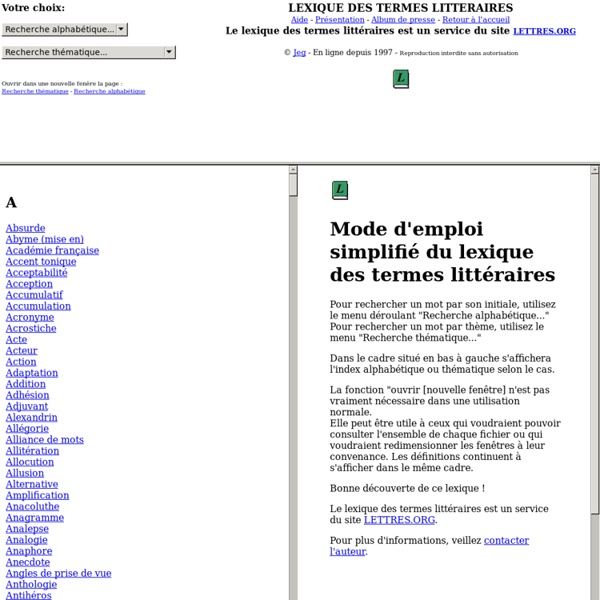



http://www.lettres.org/lexique/index.htm
Related: Poèmes • About Writing • LITTERATURES • FRANCAISIl pleure dans mon coeur (Paul Verlaine 1844-1896) Heart and Raindrops This poem I would like to discuss “Il pleure dans mon coeur” was written by Paul Verlaine in 1874. Beneath is the original poem and underneath to the right of it is the best translation I could find without the brutal attempt of trying to make it rhyme (while subconsciously destroying all of its meaning) Il pleure dans mon coeurComme il pleut sur la ville,Quelle est cette langueurQui pénètre mon coeur ? 100 Best First Lines from Novels 1. Call me Ishmael. —Herman Melville, Moby-Dick (1851) 2. It is a truth universally acknowledged, that a single man in possession of a good fortune, must be in want of a wife. —Jane Austen, Pride and Prejudice (1813)
75 Simple British Slang Phrases You Should Probably Start Using Oh, the Brits. No-one can snark quite like they do, and there are certain turns of phrase that are so utterly delightful, the rest of the world really should sit up and take note. Below are just a few common British phrases that you might like to work into your daily vernacular, as they can pepper any conversation with a little extra something. Autumn Leaves: the story of the song - French Moments Les Feuilles Mortes… The sight of a colourful autumn scene in a forest reminds us of a popular French song written in the aftermath of WW2. “Les Feuilles Mortes” has this nostalgic touch attached to it and fits perfectly for the autumnal season when summer is long gone and the prospect of a cold winter is ahead. About the song Les Feuilles Mortes (literally “The Dead Leaves“) is a popular French song originally recorded in 1945. It is known in English as “Autumn Leaves“. The song was composed by Joseph Kosma with lyrics by French poet Jacques Prévert.
Nude in your hot tub, facing the abyss (A literary manifesto after the end of Literature and Manifestos) Down from the Mountain Once upon a time, writers were like gods, and lived in the mountains. They were either destitute hermits or aristocratic lunatics, and they wrote only to communicate with the already dead or the unborn, or for no one at all. They had never heard of the marketplace, they were arcane and antisocial. English Listening Online Views: Biking in Cambodia Julia talks about cycing from Cambodia to Vietnam with her friends (Part 1, Part 2, Part 3, Part 4). Mixers : Bad Hair Cut Six people talk about getting a bad haircut. Plus, be sure to check out all the re-edited mixers with new activities 1-25, 26-50, 51-75, 76-100. New Videos for Mixer Listen to over 20 new videos with new speakers from Chile, Argentina, Canada, the U.S. and more.
Kinds of poetry Video Player is loading. Current Time 0:00 Duration 0:00 Introduction to Literature Old Fence. A short story has a structure and a message. Can you analyze this picture in much the same way as a short story? What Is a Short Story? Cambridge English Teacher From 1 May 2017, Cambridge English Teacher is no longer available, but all the courses and content are now available to purchase without membership. Courses You can find the online teacher development courses on the Cambridge Learning Management System. Buy Courses as a teacher Buy Courses as an institution There are also additional courses to help you improve your teaching. "Poems of Jacques Prévert" Deep South v.3. n.1. (Autumn 1997) Copyright (c) 1997 by Alastair Campbell
Style: Definition and Examples I. What is Style? While you may not think about it all the time, there’s a lot more to literature than storylines and content. In literature, style is the way in which an author writes and/or tells a story. It’s what sets one author apart from another and creates the “voice” that audiences hear when they read. There are many important pieces that together make up a writer’s style; like tone, word choice, grammar, language, descriptive technique, and so on.
Literary Devices and Literary Terms Introduction Commonly, the term Literary Devices refers to the typical structures used by writers in their works to convey his or her message(s) in a simple manner to his or her readers. When employed properly, the different literary devices help readers to appreciate, interpret and analyze a literary work. Two Kinds of Literary Devices